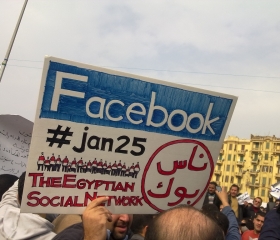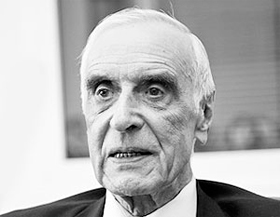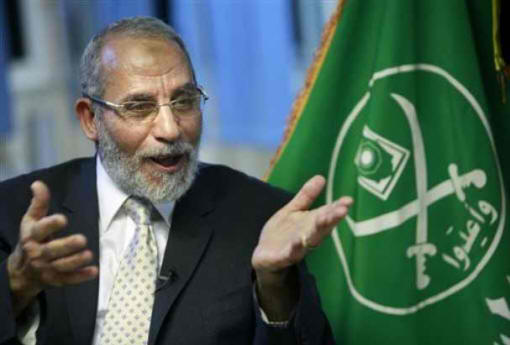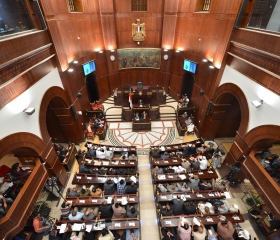Dialogue with Muslim Brotherhood Should Be Continued
Members of the Muslim Brotherhood and
supporters of deposed Egyptian President
Mohamed Mursi shout slogans in front
of army soldiers at Republican Guard
headquarters in Nasr City, Cairo July 8, 2013.
In
Login if you are already registered
(no votes) |
(0 votes) |
In a special RIAC interview IMEMO RAS Principal Research Fellow, Doctor of History, Georgy Mirsky shares insights on current developments in Egypt, protest actions and subsequent resignation and detention of Mohammed Morsi. The expert believes that an attempt to oust the Muslim Brotherhood from the political scene would be the worst mistake the Egyptian army and the opposition can now make.
Interview
In a special RIAC interview IMEMO RAS Principal Research Fellow, Doctor of History, Georgy Mirsky shares insights on current developments in Egypt, protest actions and subsequent resignation and detention of Mohammed Morsi. The expert believes that an attempt to oust the Muslim Brotherhood from the political scene would be the worst mistake the Egyptian army and the opposition can now make.
Mr. Mirsky, huge protests erupting in Egypt on June 30 have led to the overthrow of Mohammed Morsi. In your opinion, what was the main cause of discontent of millions of Egyptians across the country? Has the fact that Mohammed Morsi is a leader of Muslim Brotherhood played any role in this process?
First of all, it should be noted that after the overthrow of Mubarak the country plunged into turmoil, degradation, and general decline, which always happens after a revolution and regime change. People know little of history, and what they do know hasn’t taught them lessons. And people in Egypt believed then that if the despot was swept away, freedom and happiness would set in. Indeed, freedom did come, but now we can see what it has led to. Those who have gained power are not afraid of anything any more and do not trust anyone. They know that a million of them can overthrow any government. So the freedom is there, but happiness is not, because any revolution, or any change in the regime, results first in political instability and second in economic disintegration, which is exactly what we are seeing in Egypt. Such a scenario would have worked in the country, regardless of the person in power. Therefore, we shouldn’t put all the blame on Morsi.
I must say that no matter who took the helm of the state - any party or any person – nothing good would have probably come out of it. Because everything immediately begins to fall apart: there is no discipline, unemployment remains as high as it was, tourism faces a decline, and the famous Christmas Nile river cruise ships are lying idle and empty. Gas prices have gone up and people have to spend two hours in queues at gas stations to refuel, there are power outages, etc., etc. In economic terms, it’s not Morsi’s fault. If foreign aid had been provided, the situation would have been different. Of course, Saudi Arabia and other Gulf countries did deliver some help, but it was not enough. Western aid was needed badly; it was necessary that the International Monetary Fund finally allocated the promised $ 4.8 billion. This would have opened the way for investment, loans, etc. But the IMF hesitated, and now we have to admit that this was a misfortune rather than fault of Morsi and the Muslim Brotherhood. It was expected that having come to power, the moderate Islamists would create an Islamic state and establish theocratic power, imposing the harshest Sharia law. In this situation, the West refrained from taking any action, playing for time and not rendering Morsi any support.
In your opinion, is there a division in society between those who support M. Morsi and the opposition? How strong are the contradictions between the two “blocks”?
Many people in Egypt (about 50%) are afraid of a clerical theocratic state. Note that in the elections just a year ago, Morsi received only 1.5 percent more than his rival Shafiq. In other words, half of the Egyptian population is for him, and the other half is against him. But a year has passed, and the first half has diminished significantly due to the current economic problems. Those who hoped that with Mubarak out, the country would turn into a paradise, realized they were wrong. In my opinion, the share of Morsi’s supporters now is about 30%. The same is true for the Muslim Brotherhood. This is no small force, but it is not decisive yet. People who actually started the first revolution in 2011 – the democratically-minded youth, partially educated, with degrees, but unemployed – have livened up again. This youth cannot be called pro-Western, but it sure is secular. That is, it has turned out that all the people who wanted to see Egypt become a normal, secular, democratic, modern and developed country have started to have doubts that they would see it with Morsi in power. According to them, although he promised to be the president of all Egyptians, he actually became the president of those who voted for him, that is the Muslim Brotherhood. Morsi himself is an ordinary person without charisma, he has never been the leader of the Muslim Brotherhood, and he was not even the first presidential candidate. The main leader is Mohammed Badie. Morsi, I repeat, is an ordinary person and he is not the matter at issue at all. During protest actions like this, people tend to personalize their protest. We could hear slogans “Down with Mubarak!” in Egypt, but Mubarak was not a dictator, “Down with Erdogan!” in Turkey, but Erdogan is not a dictator either, and again in Egypt now “Down with Morsi!” But the Egyptians understand that it is necessary to put an end to the rule of the Muslim Brotherhood because the latter will bring the economy to collapse due to its sheer incompetence and inability to solve economic problems. Besides, they can eventually impose such strict laws that people will see that one dictatorship is replaced by another, even a worse one. In such cases, I always say, when the place is too hot for an authoritarian government, there are two possibilities. Either to crush, choke, draw blood and, most importantly, make no concessions and show no weakness or, quite the opposite, make concessions and take a course on reforms. Morsi, unwilling to quarrel with the Americans from whom he still expected help, and not wanting to antagonize secular forces completely, did not resort to coercive methods to monopolize power.
What role does the army play in modern political life of Egypt? Do you think that the Egyptian army wants to concentrate power in its hands or are its actions aimed at maintaining a balance between the supporters and opponents of the Muslim Brotherhood?
The army, of course, was not happy with the policy of Morsi. After Mubarak was overthrown, the army assumed the role of arbitrator. It created the Supreme Council of the Armed Forces, which actually ruled the country. All conditions were created for Muslim Brothers to participate in free elections. In the end, Muslim Brothers gained victory and the military put no obstacles in their way. And what did Morsi do? He treated them like boys. He summoned all the military commanders and declared that they were all fired. They walked away. But that does not mean that the army lost and decided to stay in the background. The army in Egypt is not just the army; it is the largest economic actor. By some estimates, up to 30% of the economy, from cement plants to travel companies and gas stations, is controlled by the military. The military under Mubarak built villas, cottages, mansions, bought foreign cars, etc. Of course, they were afraid that if the Muslim Brothers monopolized power, they would finally get to the generals. So the military from the very beginning treated the Muslim Brotherhood with extreme suspicion. After Morsi treated the supreme command so nastily, the new generation took over. Although the latter is younger and lower in rank, it exceeds the older generation in will and drive. And now, when things are headed towards civil war, the military realized that that their time had come and they set out.
How likely is the establishment of the military junta in Egypt?
Currently, the world media is trying to figure out if the developments in Egypt may be called a military coup. Of course, they could be. This was a typical military coup, but that does not mean the establishment of a military regime. A military coup does not necessarily lead to the establishment of a military dictatorship and that's what most people do not understand. Take Turkey, for example. The military there have repeatedly changed power, but they have never made any general the country’s ruler. They have just replaced one civilian leader with another who suited them better. This is a military operation. And in Egypt we see a military coup and not a military dictatorship, for at least two reasons: first, who wants to take responsibility for the fate of the country in devastation? The military realizes that they are not able to do anything with the economy; at least, they can do no more than Morsi. It is important to have a technocratic government so that the military do not take responsibility for everything that happens. Moreover, the position of America is very important. The Americans have already announced that if a military dictatorship is established, they will cease financial assistance to the army. And half of the 1.5 billion dollars that America gives Egypt every year goes to the army. All Egyptian generals are graduates of the U.S. military academy. All weapons are American; all financing is American, so the Egyptian army does not want to go against the U.S. For these two reasons, they overthrew the previous government and formed a new one. But if the military dictatorship is out of the question, then what will happen next? There are three forces that were in the limelight last year: the Muslim Brotherhood, the secular opposition and the army. Now the army and the secular opposition have united. Trying to oust the Muslim Brotherhood from the political scene would be a terrible mistake. One should not forget that in the presidential election a year ago half the population voted for them. And in the parliamentary elections they got more than 40% of the votes, while more than 20% voted for the Salafis, which is a more extreme militant organization. Thus, more than 60% of the voters support the Muslim Brotherhood’s motto – “Islam is the solution.” Despite the fact that now this number has shrunk, at least a third of the population is still backing the Islamists. And to pretend that they've gone, that they were defeated is a terrible mistake, a disaster. I think that the Muslim Brotherhood should be involved – even crushed and deprived of a head – in drawing up a new constitution and forming a new government. They should be able to run their candidates for both parliamentary and presidential elections. They are unlikely to win this time, but they should not be underestimated, as this organization has existed for 90 years. It is a powerful machine that brings into play many well-respected people. For decades, they cared for the poor, creating mutual benefit societies, schools, etc. The common people go for them. They can not be ignored - or, I repeat, it will be is a disaster.
In your opinion, what awaits Egypt in the near future?

Did social media play a helpful
role in the Arab Spring?
There will be a transition period, during which the army will play the same arbitrator role as after the overthrow of Mubarak. A new constitution will be drawn up and the country will prepare for new elections. But there will a struggle within the victorious opposition too. Who is in the opposition now? First, it is the young people who in January 2011 used Facebook to organize, that is, young, educated, secular, democratic-minded guys. Then, representatives of Mubarak’s regime are also in the opposition, that is security officers, bureaucrats, businessmen associated with the former regime, “fat cats” as they are often called. They hated Islamists, did their utmost to stop them and sabotaged the policy of Morsi. Now they will try to take power into their own hands and go back to what it was under Mubarak. Without him, of course. So at first conflict between the progressive and democratic secular-minded young people and representatives of Mubarak regime is inevitable. And we should not forget that Egypt after all is a Muslim country. The main reason why they won the parliamentary elections, was the fact that the majority of the population are illiterate, the urban poor. An agitator comes to their homes and asks: “Are you Muslim?” – “Yes.” – “So who are you for? Are you for Islam? Or for America and the Jews?” – “For Islam.” – “Then go and vote for the Muslim Brotherhood.”
These people are a huge force. If they believe what the Muslim Brothers will start saying, that America has gained a victory, that Jews, Zionists and Israel were the winners, then after a short while, especially if the economy fails to recover quickly or slides into the abyss, discontent will begin to gain ground. Then after some time, people will turn against the new leadership. Especially in today’s Egypt with no charismatic and strong leader. So the period of instability is far from being over. The first days after the coup have shown that Egyptian society is hopelessly polarized. Opponents and supporters of the Muslim Brotherhood intend to seek their own, diametrically opposed goals with the same ferocity. “Morsi will never return” against “We will die, but get Morsi back.” Extremist Salafist party that calls itself an-Nur adds oil to the fire using the failure of Muslim Brothers to intercept their audience. Vladimir Putin is right: there was a threat of civil war.
Mr. Mirsky, thank you very much for the interesting conversation.
Interviewer: RIAC Program Coordinator Alexander Eliseev
(no votes) |
(0 votes) |






